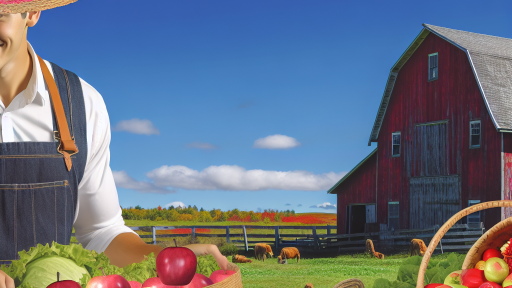Introduction to Agri-Tourism
Agri-tourism blends agriculture with tourism, creating unique experiences for visitors.
This growing field offers farmers a new way to diversify income.
It allows tourists to engage directly with farm life and practices.
In essence, agri-tourism highlights farms as tourist destinations.
Definition of Agri-Tourism
Agri-tourism encompasses farm-related activities that attract visitors.
These activities can include farm tours, picking fruits, and educational workshops.
Moreover, visitors can enjoy events like harvest festivals and country fairs.
Every experience emphasizes the connection to agriculture.
The Scope of Agri-Tourism
The scope of agri-tourism extends beyond simple farm visits.
It can involve accommodations, such as farm stays and cabins.
Additionally, restaurants and markets may feature locally sourced products.
Agri-tourism fosters relationships between farmers and consumers.
Benefits for Farmers
Farmers gain financial benefits through agri-tourism initiatives.
They can supplement traditional income by diversifying revenue streams.
Moreover, it enhances community engagement and support for local farms.
Transform Your Agribusiness
Unlock your farm's potential with expert advice tailored to your needs. Get actionable steps that drive real results.
Get StartedThis practice also encourages sustainable farming by educating visitors.
Emerging Trends in Agri-Tourism
Agri-tourism continues to evolve with new trends emerging frequently.
Farmers are adapting to shifting consumer preferences and interests.
Technology integration offers innovative visitor experiences.
For instance, online booking systems enhance convenience for tourists.
Additionally, social media plays a vital role in promoting agri-tourism.
Current Market Trends in Agri-Tourism
Growing Consumer Interest
Consumer interest in agri-tourism continues to rise steadily.
People seek authentic experiences that connect them with agriculture.
As a result, farms offering tours and activities attract more visitors.
Moreover, consumers increasingly prefer local and sustainable products.
This shift fuels demand for farm-based experiences.
Diverse Offerings in Agri-Tourism
Farmers are expanding the types of experiences they offer.
Common options include pick-your-own fruit and vegetable events.
Workshops on farming techniques are also gaining popularity.
Additionally, some farms host farm-to-table dinners.
These offerings provide both entertainment and education.
Family-Friendly Activities
Family-friendly activities play a crucial role in agri-tourism.
Farmers increasingly design experiences that cater to children.
Examples include petting zoos, hayrides, and corn mazes.
Such activities entice families to spend more time on the farm.
Notably, engaging children helps to foster future generations’ connection to agriculture.
Leveraging Technology
Technology is transforming the agri-tourism landscape.
Farmers utilize social media to promote their experiences effectively.
Online booking systems enhance convenience for visitors.
Showcase Your Farming Business
Publish your professional farming services profile on our blog for a one-time fee of $200 and reach a dedicated audience of farmers and agribusiness owners.
Publish Your ProfileVirtual tours have also gained traction, especially post-pandemic.
These tools allow farms to reach broader audiences, even remotely.
Health and Wellness Focus
The health and wellness trend influences agri-tourism significantly.
Many visitors seek out fresh, organic produce directly from farms.
Wellness activities like yoga classes are becoming more common on farms.
This trend encourages visitors to connect with nature and promote well-being.
Consequently, farmers are increasingly incorporating wellness into their offerings.
Community Engagement
Community engagement enhances the appeal of agri-tourism.
Farmers collaborate with local businesses for special events.
This cooperation promotes local culture and generates community support.
Additionally, community events attract larger crowds to farms.
Ultimately, this strengthens relationships between farmers and their communities.
Benefits of Incorporating Agri-Tourism on Farms
Additional Revenue Streams
Agri-tourism creates new income opportunities for farmers.
This approach enhances profitability beyond traditional farming methods.
Visitors contribute financially to local economies by spending on-site.
Moreover, these activities can boost sales of farm products.
Community Engagement
Agri-tourism fosters stronger connections within the community.
Farmers interact with visitors, sharing their passion for agriculture.
Such interactions build awareness and appreciation for farming.
Additionally, community events can attract local residents.
Educational Opportunities
Farm tours educate visitors about agricultural practices.
Hands-on experiences deepen understanding of food production.
Furthermore, educational workshops can increase knowledge about sustainability.
This fosters a sense of stewardship for the environment.
Preservation of Agricultural Heritage
Agri-tourism plays a crucial role in preserving farming traditions.
By showcasing heritage techniques, farmers promote cultural values.
This attracts those interested in learning about agricultural history.
Consequently, farms become centers for cultural exchange.
Increased Visibility and Marketing
Agritourism activities enhance the visibility of local farms.
Farmers can market their products effectively to a broader audience.
This increased exposure often leads to repeat visitors.
Social media platforms further amplify marketing outreach.
See Related Content: Marketing Your Farm with Agri-Tourism Strategies
Popular Agri-Tourism Activities and Experiences
Farm Tours and Educational Experiences
Farm tours offer visitors a unique insight into farm life.
Guests can explore fields, barns, and livestock areas.
Additionally, educational programs teach about sustainable practices.
Farmers can hold workshops on topics like organic farming.
These experiences often engage children and families.
Pick-Your-Own Experiences
Pick-your-own activities are increasingly popular with tourists.
Farms can offer fruits, vegetables, and flowers for picking.
Showcase Your Farming Business
Publish your professional farming services profile on our blog for a one-time fee of $200 and reach a dedicated audience of farmers and agribusiness owners.
Publish Your ProfileThis hands-on experience connects visitors with the food source.
It encourages families to spend quality time outdoors.
Moreover, it generates additional income for farmers.
Farmers’ Markets and Local Produce Sales
Farmers’ markets are vibrant hubs for local produce.
They provide a platform for direct sales from farmers to consumers.
Visitors enjoy fresh fruits, vegetables, and homemade products.
These markets foster community connections and awareness.
They also showcase the diversity of local agriculture.
Seasonal Festivals and Events
Seasonal festivals attract visitors throughout the year.
Farmers can host harvest festivals, pumpkin patches, or spring blooms.
These events offer entertainment, such as hayrides and corn mazes.
Food tastings and local artisan showcases enhance the experience.
Additionally, they promote local agriculture and culture.
Agritourism Lodging
Farm stays provide unique accommodation options for travelers.
Guests can enjoy rustic experiences while staying on the farm.
Such lodging often includes home-cooked meals and farm tours.
Visitors appreciate the immersive experience of farm life.
Furthermore, it creates additional revenue streams for farmers.
Uncover the Details: Building a Direct-to-Consumer Farm Sales Strategy
Case Studies: Successful Agri-Tourism Ventures
Farm Visit Experience
The Green Leaf Farm in Oregon exemplifies innovative agri-tourism.
Visitors participate in seasonal harvest activities on the farm.
Moreover, the farm offers cooking classes focused on local produce.
This hands-on approach cultivates a deeper connection with agriculture.
Consequently, the farm sees a continuous increase in visitors each year.
Farmers’ Markets and Events
Sunnydale Acres in California hosts weekly farmers’ markets.
The markets feature fresh produce, handmade crafts, and local music.
Visitors enjoy a lively atmosphere, boosting local community engagement.
Additionally, seasonal festivals draw larger crowds, enhancing revenue.
Through these events, Sunnydale successfully promotes local farming.
Agricultural Workshops and Education
Willow Brook Farms in Texas offers a range of educational workshops.
These workshops cover topics like sustainable farming and gardening.
Participants engage with experts, gaining valuable insights.
Furthermore, the farm hosts school groups for educational field trips.
This initiative fosters an appreciation for agriculture among youth.
Eco-Friendly Retreats
The Harvest Moon Retreat in Vermont combines relaxation and agri-tourism.
Guests can stay in eco-friendly lodgings surrounded by nature.
Additionally, they can participate in guided farm tours and tastings.
This unique experience attracts environmentally conscious travelers.
Ultimately, it supports sustainable practices while boosting income.
Pick-Your-Own Operations
Berry Meadows Farm in Michigan offers a pick-your-own berry experience.
Showcase Your Farming Business
Publish your professional farming services profile on our blog for a one-time fee of $200 and reach a dedicated audience of farmers and agribusiness owners.
Publish Your ProfileThis initiative allows families to engage in fruit picking together.
Moreover, the farm sells homemade jams and jellies made from harvested berries.
This generates additional income while enhancing the visitor experience.
Consequently, Berry Meadows has become a beloved local attraction.
See Related Content: The Farmer’s Role in the Farm-to-School Movement

Regulatory Considerations for Farmers Entering Agri-Tourism
Understanding Local Laws
Farmers must first understand local laws regarding agri-tourism operations.
These laws can vary significantly from one area to another.
Consulting a local attorney helps clarify specific regulations.
Farmers should also stay informed about any recent legal changes.
Permits and Licenses
Obtaining the necessary permits and licenses is crucial.
Common permits may include health and safety licenses.
Farmers should check with local authorities for specific requirements.
Each type of activity could require different permits.
For instance, serving food may require additional health inspections.
Insurance Requirements
Farmers must consider adequate insurance coverage for agri-tourism activities.
This includes general liability insurance to protect against accidents.
Special event insurance might also be necessary for large gatherings.
Consulting an insurance agent familiar with agri-tourism is recommended.
Safety Regulations
Implementing safety regulations is essential to protect visitors.
Farmers should create clear safety guidelines for their facilities.
Regular safety training for staff ensures compliance with regulations.
Additionally, farms should routinely inspect equipment and attractions.
Marketing and Tax Implications
Understanding marketing regulations is vital for promoting agri-tourism.
Farmers should follow guidelines for advertising and promotions.
Moreover, tax implications from added revenue streams must be considered.
Farmers may need to consult a tax professional for guidance.
Delve into the Subject: Sustainable Farming Through Local Food Sourcing
Marketing Strategies for Agri-Tourism Farms
Understanding Your Target Audience
Identifying your target audience is crucial for marketing success.
Start by gathering demographic information about potential visitors.
Consider factors such as age, location, and interests.
This data helps tailor your offerings to meet visitor preferences.
Leveraging Social Media
Social media platforms are powerful tools for engagement.
Utilize Instagram and Facebook to showcase your farm’s unique experiences.
Share high-quality images and engaging stories regularly.
Encourage user-generated content by hosting contests.
Creating Unique Experiences
Offer visitors unique experiences that stand out from typical attractions.
Consider farm-to-table dinners or workshops on sustainable farming.
These activities create memorable experiences that encourage return visits.
Enhancing Online Presence
An effective website is essential for attracting tourists.
Ensure your website is user-friendly and mobile-responsive.
Showcase Your Farming Business
Publish your professional farming services profile on our blog for a one-time fee of $200 and reach a dedicated audience of farmers and agribusiness owners.
Publish Your ProfileInclude detailed information about your farm, activities, and events.
Utilize SEO strategies to enhance your visibility in search engines.
Collaborating with Local Businesses
Build partnerships with local businesses to expand your reach.
Consider collaborating with restaurants or hotels for cross-promotion.
Joint marketing initiatives can attract more visitors.
Utilizing Email Marketing
Email marketing continues to be an effective outreach strategy.
Collect emails from visitors and interested customers.
Send regular newsletters showcasing upcoming events and promotions.
Personalize your emails to increase engagement and response rates.
Participating in Local Events
Engage with your community by participating in local events.
Farmers’ markets, fairs, and festivals provide excellent exposure.
Use these opportunities to promote your agri-tourism offerings.
Gathering and Utilizing Customer Feedback
Feedback from visitors is invaluable for improving your offerings.
Encourage guests to share their experiences through reviews.
Use surveys to gather insights and suggestions for enhancements.
Implementing changes based on feedback increases satisfaction.
The Future of Agri-Tourism: Predictions and Innovations
Emerging Trends in Agri-Tourism
Agri-tourism is evolving rapidly and creating unique opportunities for farmers.
Farmers can expect increased demand for immersive experiences on their properties.
These experiences often include farm tours, workshops, and hands-on activities.
Additionally, visitors are more interested in learning about sustainable practices.
This trend encourages farmers to promote their eco-friendly methods.
Technology Integration in Farming
Technology plays a vital role in attracting tourists to farms.
Farmers can utilize apps and websites to facilitate bookings.
Moreover, virtual reality tours can showcase farm activities remotely.
Advanced tools improve visitor engagement through interactive maps and guides.
Smart sensors can enhance safety and efficiency on the farm.
Partnerships and Collaborations
Collaboration between farmers and local businesses is on the rise.
Partnerships with restaurants can promote farm-to-table dining experiences.
Local artisans can present crafts, enhancing the visitor experience.
Such collaborations can lead to package deals that attract more tourists.
Moreover, community events can strengthen local ties and boost visibility.
Health and Wellness Focus
Health-conscious tourists are seeking wellness experiences on farms.
Farmers can offer yoga classes, guided meditations, and organic meals.
Additionally, workshops on nutrition and cooking can appeal to this demographic.
Such initiatives promote mental and physical well-being.
They also showcase the nutritional benefits of local produce.
Environmental Stewardship and Education
Agri-tourism can educate visitors about environmental stewardship.
Farmers can hold educational tours focusing on biodiversity and conservation.
Hands-on activities can teach sustainable farming techniques.
This approach fosters a deeper appreciation for agriculture and the environment.
Showcase Your Farming Business
Publish your professional farming services profile on our blog for a one-time fee of $200 and reach a dedicated audience of farmers and agribusiness owners.
Publish Your ProfileVisitors leave with valuable knowledge to share in their communities.
Additional Resources
Immigrant Farmworkers and America’s Food Production – 5 Things to …
Farm to Table: Building Local and Regional Food Systems – SARE




